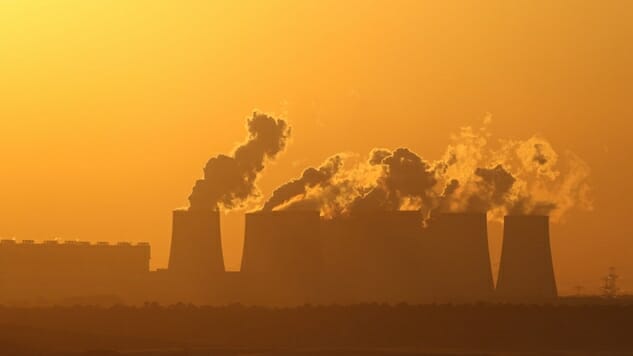One of Mankind’s Best Hopes to Combat Climate Change Is to Literally Block Out the Sun
Photo by Sean Gallup/Getty
Last month, scientists issued a dire warning: unless we dramatically change our global economy to rely on an energy source other than fossil fuels in the next ten years, the Earth will become incredibly hostile to human life in twenty years. Given the collective shrug in response from our elite political and economic classes, it’s pretty hopeless that we will do what is required to combat this existential threat to humanity. Humans are simply too selfish and shortsighted to address a problem like this until it is too late, which means that scientists have begun to think of other options to literally save the world. One encouraging option is dimming the sun. Per InTheseTimes:
But more dramatic approaches have crept into policy discussions, like solar radiation management, known as SRM. First imagined by scientists during the Cold War, SRM promises a comparatively cheap, quick fix: the continuous dispersal of aerosols into the atmosphere to reflect and absorb sunlight, cooling the planet. In effect, SRM means dimming the sun.
For proof of concept, advocates look to volcanic eruptions, which spew out plumes of aerosols. The 1883 eruption of Krakatoa, for example, reportedly lowered global temperatures by 1 degree Celsius. The best modeling suggests SRM, too, would work like a charm.
Like a volcano, however, SRM is enormously risky. Side effects could include decreasing crop yields, melting the ozone layer or irreparably altering the water cycle, flooding some parts of the world while causing prolonged droughts in others—and those are just the few we are able to model.
So why would we spray aerosols into the air if it’s so risky? Well, it’s simple: our current course where the planet warms just two degrees Celsius is certain planetary catastrophe, while melting the ozone layer with aerosols is less of a certainty. Per Popular Science:
And if we warm by 2°C, the world will be a lot drier, which will impact economies, agriculture, infrastructure, and weather patterns. Rising temperatures will damage ecosystems and species that cannot adapt, including those in coral reefs and Arctic areas. Low-lying coastal regions and small islands worldwide are at risk of disappearing as sea levels rise due to the Greenland ice sheet and Arctic ice melting at continuously faster rates. 2 degrees celsius could determine the existence of whole nations.
The world as we know it is completely screwed unless we do something unprecedented in human history. It’s easy to let fatalism set in given how few people truly care about our future, but this new generation of Democratic politicians like Alexandria Ocasio-Cortez have injected some hope into this seemingly intractable problem. The good news is that the same IPCC report which stated that we are barreling towards certain planetary catastrophe in two decades also believes that the technology does exist, and will exist to combat the problem.
Where their pessimism comes in is the political will to enact those technological changes (in other words: humans would rather destroy the world and stay on our current course than stage a revolution). It’s going to take each and every one of us to prioritize this, or in twenty years we will be facing massive food, energy and water shortages that could inevitably lead to the extinction of mankind—perhaps by the end of this century. Whether we want our species to survive is entirely up to us, and the fact that blocking out the sun is inching towards a best-case scenario is proof of how little we truly care about this existential threat to our planet. If you stand opposed to the recommendations in the IPCC report, by definition, you are in favor of the vast destruction of life on Earth. The good news is that we still have time to change our current course, but not very much.
Jacob Weindling is a staff writer for Paste politics. Follow him on Twitter at @Jakeweindling.







































